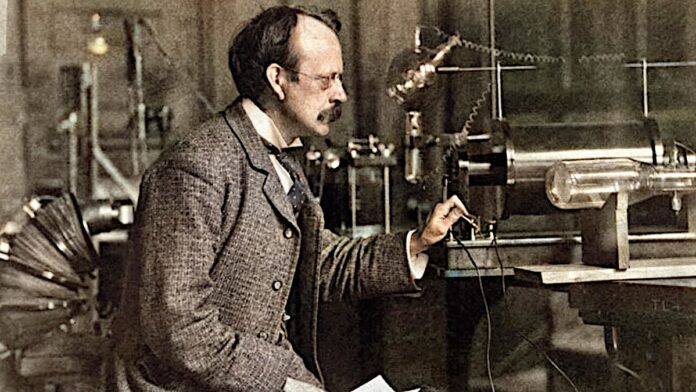In the annals of scientific history, few names shine as brightly as that of Joseph John Thomson, affectionately known as J.J. Thomson. A pioneer in the field of physics, Thomson’s revolutionary work on the nature of electricity and the discovery of the electron fundamentally transformed our understanding of the subatomic world. And it was in the vibrant city of Manchester where his most significant breakthroughs took place, forever cementing his place in the scientific pantheon.
Born on December 18, 1856, in Cheetham Hill, a suburb of Manchester, J.J. Thomson grew up in an environment ripe with scientific curiosity and innovation. His father, a bookseller, fostered a love for literature and education in the young Thomson, setting the stage for his later academic pursuits. J.J. Thomson’s journey into the world of physics began at Owens College (now the University of Manchester), where he enrolled as a student in 1870.
Under the guidance of the esteemed chemist Henry Roscoe, Thomson excelled in his studies and quickly developed an affinity for experimental research. After obtaining his bachelor’s degree, he remained at Owens College as a research assistant, delving deeper into the mysteries of electricity and magnetism. It was during this period that Thomson laid the foundation for his groundbreaking work on cathode rays.
In 1897, Thomson made his most momentous discovery—the existence of the electron. Conducting experiments with cathode rays, he noticed that they could be deflected by electric and magnetic fields. Thomson’s meticulous measurements and calculations led him to propose that these rays consisted of tiny, negatively charged particles, which he named electrons. This groundbreaking revelation upended the prevailing belief in the indivisibility of atoms and laid the groundwork for the development of atomic theory.
Thomson’s experiments on cathode rays were carried out at the Cavendish Laboratory, the renowned physics laboratory established at the University of Cambridge. However, it was his time in Manchester that played a crucial role in shaping his scientific journey. During his tenure at Owens College, Thomson conducted the initial experiments that eventually led to his cathode ray investigations, sparking the scientific curiosity that would define his career.
In addition to his research, Thomson also played a pivotal role in the development of scientific education and institutions in Manchester. In 1884, he was appointed the Chair of Experimental Physics at Owens College, a position he held for over 20 years. Under his leadership, the physics department flourished, attracting talented students and fostering a vibrant scientific community. Thomson’s mentorship and dedication to teaching inspired countless young minds, nurturing the next generation of scientists.
In 1905, Owens College transformed into the University of Manchester, a testament to the institution’s growth and reputation. Thomson continued to make significant contributions to the field of physics, receiving numerous accolades for his work. In 1906, he was awarded the Nobel Prize in Physics for his discovery of the electron, solidifying his status as a preeminent scientist.
J.J. Thomson’s impact extended far beyond his remarkable discoveries. His research and teaching laid the groundwork for future breakthroughs in the field of subatomic physics. Moreover, his emphasis on experimental investigation and meticulous measurement set a standard of scientific rigor that endures to this day.
Today, the legacy of J.J. Thomson lives on in Manchester. The University of Manchester stands as a world-renowned center for scientific research and innovation, building upon the foundations laid by Thomson and his contemporaries. The city itself embraces its scientific heritage, with plaques and landmarks commemorating Thomson’s work scattered throughout. His contributions continue to inspire aspiring scientists and remind us of the power of human curiosity and ingenuity.
As we celebrate the life and achievements of J.J. Thomson, we honor his insatiable quest for knowledge, his tireless dedication to the pursuit of truth, and his unwavering belief in the transformative potential of science. From the humble streets of Cheetham Hill to the hallowed halls of academia, J.J. Thomson’s legacy shines as a beacon of inspiration, guiding generations of scientists towards new frontiers of discovery.

